10 parents raised money to rent a house and create a community for families, where over 20 children with autism can have an experiential learning.
Published by Hui Ling Jia on October 9, 2022, 17:30 in Beijing. The following article is sourced from
Foreword:
Earlier this year, we published an article titled “Parents of Children with Autism in Beijing Decide to Pool Money to Buy a Large House for Them to Live In.” The protagonist of the article, Meng Yu, has a 20-year-old son named Hehe who has moderate to severe autism and has not had a stable place to stay after leaving school. At that time, Meng Yu and several other parents in Beijing wanted to initiate a plan: pooling funds to buy a spacious house in Beijing, where the children could live together in a community setting with professional support. This would also allow the parents to have a normal work and life routine, and it would be convenient for them to gather and meet since they are in the same city.
However, due to factors such as location and high property prices, they struggled to find an ideal house.
Today, we will report to you the latest progress of this plan: in the first half of this year, they found a house, and after renovation, it officially opened on August 15. Currently, there are a total of 28 contracted young adults with intellectual disabilities (with the majority being individuals with autism, approximately 20) living here for almost two months.

This is an achievement jointly accomplished by parents from Beijing’s autism community and the well-established service organization, ALSOL. With parents primarily providing funding and handling enrollment, ALSOL offers professional services, aiming to create a high-quality community life for adults with intellectual disabilities. It has a warm and fitting name - Hui Ling Jia He.
The characteristics of Huiling Jiahe is, first and foremost, its collaborative approach. It involves cooperation among parents (with 10 parents providing funding for renting the house) and between parents and the service organization (parents collectively purchasing services from ALSOL). Through a “joint-stock cooperation” model, this innovative initiative relies on the financial advantages of parents and the professional expertise of ALSOL to create a sustainable source of funding.
Moreover, the service model of Jia He differs from ALSOL’s traditional round-the-clock services. Young adults with intellectual disabilities can choose to stay overnight or only participate in daytime activities. They can decide how many nights they want to stay based on their own needs. Some individuals may only come to participate in activities a few times a week. If parents don’t have time to accompany their children on weekends, they can also send them to Jia He. In a way, it offers the flexibility of staying in a hotel.
How did Hui Ling Jia He go from an idea to a reality? How do parents collaborate with ALSOL? What services can be enjoyed here? Are the children happy? Can this model be replicated in other cities?
Before the National Day holiday, our team entered the courtyard of Hui Ling Jia He and interviewed Meng Yu, a representative of the parents, and Meng Weina, the founder of ALSOL. At the same time, we had the opportunity to go on an autumn outing and picnic in the park with the children, observing their behavior up close and the details of the services provided by ALSOL.
01 The first challenge for providing services for older individuals in big cities is the lack of housing.
Hui Ling Jia He is located in the Xihongmen area of Fengtai District, south of Beijing, between the Fourth and Fifth Ring Road, with nearby subway access. It is a three-story stacked villa-style residential area with a total floor area of over 200 square meters, and each floor has livable rooms. The first floor is mainly the activity area and dining room, where children can watch TV, bake, draw, and learn music. The second floor is the girls’ room, including a tranquil room, and the third floor is the boys’ room, with a larger balcony. Each floor has its own independent bathroom. In addition, there is also a 40-square-meter activity area in the front yard for playing basketball.
The courtyard can accommodate around 10 children for overnight stays (with bunk beds, initially parents can also accompany them), and is staffed with 2-3 teachers at night. In addition to the daytime teachers, there are estimated to be 6 teachers serving the entire courtyard.
There are neighbors on both sides of the house, and the residential area has a relatively high green area, as well as an activity square and fitness area. There are convenience stores, restaurants, laundromats, pharmacies, and other facilities just outside the door, and a larger park can be reached within a 20-minute walk. From the perspective of the house’s space, design, and surrounding environment, it is a relatively ideal place for a community family.
After the house was finalized, Meng Yu breathed a sigh of relief. For over half a year, finding a house had been a burden on his mind. Houses in big cities are scarce and expensive, which has always been a bottleneck for providing services for older individuals, for both parents and ALSOL.
When ALSOL was initially established in Beijing in 1999, there were mainly two service locations: Jingshan Qianjie and Fangzhuang. The larger-scale Jingshan Qianjie headquarters was just a stone’s throw away from the Forbidden City, and the young people lived in courtyards and hutongs, enjoying a comfortable life. However, as the rent soared year after year, ALSOL in Beijing had to frequently move, with up to 4 moves in one year. Now, there are only two service locations left, and they are all located outside the Fifth Ring Road.

2004年的老照片,孟维娜(左三)和北京慧灵的学员。那时的北京慧灵地处四合院群落之中,非常有利于心青年建立社交关系,孩子们还会带着老外逛胡同。
When Meng Yu was looking for a house, he considered factors such as the children’s emotions, physical exercise, and community integration. He really hoped that his children could live more comfortably in a community with a strong atmosphere, without being too remote. At the same time, it was important that the landlord and neighbors were willing to accept this group of children.
Fortunately, a parent within the community in Beijing expressed willingness to rent out their own house to the children. Being part of the same circle, having a parent as the landlord saved them from a lot of unnecessary explanations and troubles.
“This house is rented at market price, as long as the parents don’t sell the property, it will be continuously rented to us. Renting is just a transitional phase as we explore this arrangement. If the cooperation goes well, we will consider acquiring our own property,” Meng Yu revealed.
02 Parents contribute, Hui Ling provides the service.
With the acquisition of houses, the Jiahe Project has taken a big step forward. What’s the next step? How will the parents collaborate with Hui Ling?
In May 2021, at the invitation of Zhang Wujuan, Vice President of Hui Ling, parents Li Junfeng and Meng Yu, along with others, made a special trip to Hui Ling in Guangzhou for a visit. Guangdong, as the headquarters of Hui Ling, owns several properties with independent intellectual property rights. The concept of community integration is fully implemented here, which greatly excited the parents from Beijing and made them see Hui Ling as the most ideal partner for collaboration.
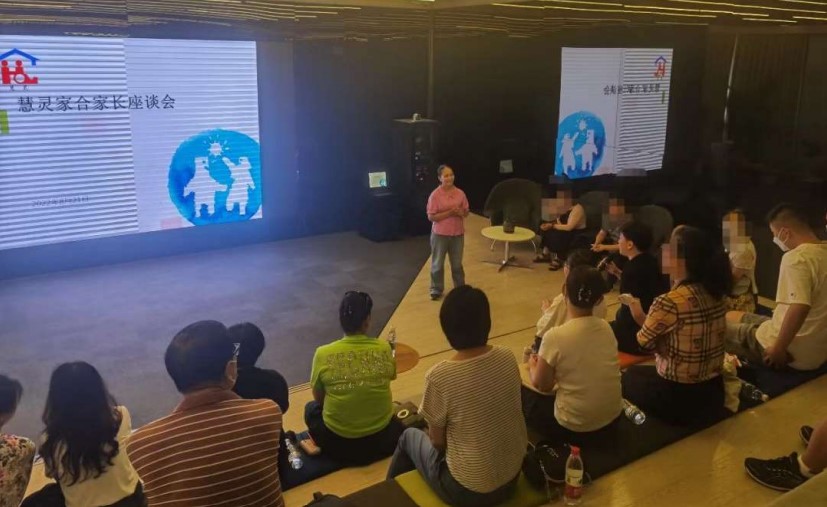
慧灵·家合家长座谈会现场,来自台湾的资深社工李慧萍老师向家长们介绍,经过评估和观察后孩子们的优点。
“Hui Ling’s mission is to promote community integration. We open our doors and are happy to collaborate with anyone,” said Meng Weina. She also candidly expressed that she was even more delighted when parents from Beijing approached them. “Many of those who seek to collaborate with us are from economically disadvantaged backgrounds. We certainly welcome them, but the operational pressure will continue to increase. Parents from Beijing have stronger financial capabilities, which can alleviate our funding difficulties and allow us to focus on providing our best services.”
This does not mean that Hui Ling favors the rich over the poor. “Regardless of wealth, the basic logic and thinking behind community integration services are the same - to meet the needs of young hearts through professional services. However, high-quality community families have higher requirements for the environment, hardware facilities, teacher selection, training, and other aspects. All of these require funding, which Hui Ling and many parents are still unable to achieve,” explained Meng Weina.
In the end, after joint discussions between the parents and Hui Ling, both parties agreed on a “cooperative shareholding” model. Parents would contribute the majority of the funds, while Hui Ling would provide a smaller investment and services. Contributing parents would also open up enrollment to the public.
Once the news of shareholding fundraising was announced, the original shares of 1 million yuan were claimed in just a few days: 9 parents raised 650,000 yuan, and Li Junfeng, also a parent, contributed 160,000 yuan individually. With the courage to move forward together, Hui Ling claimed 190,000 yuan of the shares.
“The 9 parents first established a limited partnership company and then collaborated with Hui Ling as a limited partner, registering and establishing another joint venture company. Teacher Li Junfeng is our coordinator and balances the interests of all parties in case of disagreements. Although parents contributed the majority of the funds, for professional considerations, we delegated more decision-making power to Hui Ling, and in terms of voting rights, Hui Ling holds 35%,” said Meng Yu.
It is understood that most of the contributing parents are from the older age group of parents. It is worth noting that a small number of parents participated in the investment, but their children do not receive services from Jiahe. For example, one investor is not active in the parent group chat but expressed a desire to contribute to such a service because she believed that this exploration would benefit the entire community.
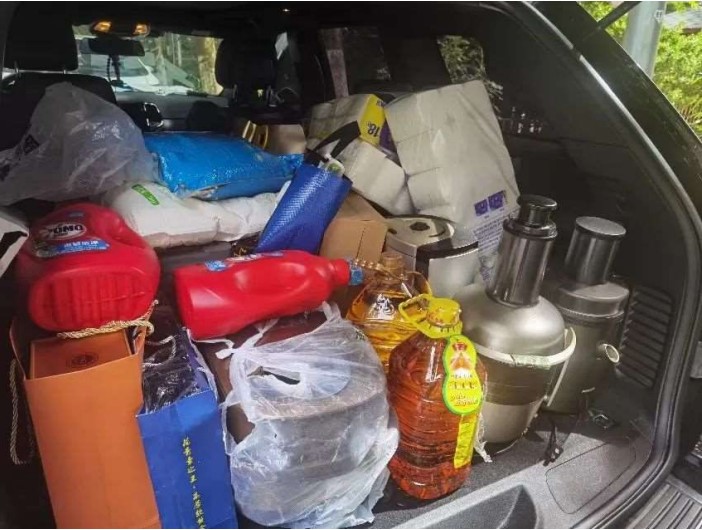
家长和老师们捐赠物资
Contribution towards this vision is also a common aspiration among many parents. When the concept of Hui Ling Jiahe was introduced this year, it quickly gained widespread attention in the community. Prior to the opening of the courtyard in July, donations were sought from the public, hoping for the donation of some daily necessities. Many parents and professionals extended their help, and items such as televisions, dining chairs, washing machines, thermos flasks, and flour gathered from all directions. This mutual support between the community is heartwarming and reflects the external expectations for Hui Ling Jiahe.
03 The most common problem for adults is not having a place to go and nothing to do.
In many of our articles, we have been conveying a concept to parents that addressing the issue of adult placement does not mean simply sending their children to an institution where they are taken care of by caregivers, with their basic needs met. Such a life is not the desired state for young adults in their twenties and thirties.
“After individuals with autism grow up, the common problem they face is not having a place to go and nothing to do. The next concern is what to do when parents grow old or pass away,” said Meng Yu. Even in Beijing, there are not many options for adults with autism. Some go to places like Warm Home or Vocational Rehabilitation Centers, but due to limited professional services, the skills they learn there are limited as well. Supported or sheltered employment is even rarer.
“Not everyone can work, but everyone needs to live. What parents urgently desire is for their children to learn some skills in daily life, continuously adapt to their environment, participate in collective activities to some extent, have companions, and engage in meaningful tasks within their abilities. They want their children to have a fulfilling life,” he said.

孟郁和儿子禾禾,在北京雁栖湖。
This is also the significance of Hui Ling Jiahe. It is positioned to provide support for the long-term community-based living and related daytime activities for adults with intellectual disabilities. The residential services can help them achieve various life goals, including learning life skills, growing independently and gradually reducing their dependence on parents, meeting more peers and maintaining relationships, and achieving stability in their living conditions. More importantly, these services greatly assist them in adapting to a permanent “home” in the future.
Hui Ling Jiahe inherits the community-based concept from traditional Hui Ling service models but completely breaks away from tradition when it comes to specific services.
Hui Ling has conducted several surveys on the needs of parents in Beijing, and the feedback data showed that while parents have a consistent overall goal, their specific needs vary greatly. Few parents are willing to choose the traditional round-the-clock model, and instead, they propose different “can we” scenarios: Can they choose to stay overnight or not; can they stay for two days a month or for 20 days; can they participate in full-day activities or only attend a 3-hour baking workshop; can the child be picked up after finishing dinner as the parents get off work at five…
“The diversity of services and the structure of services demanded by parents in Beijing are already in line with international standards,” Meng Weina commented. In developed countries, it is rare for a service recipient to live in one institution all year round, and it is impossible for one institution to provide a colorful and fulfilling life. In reality, our country is not yet able to achieve this, and the government is accustomed to funding designated institutions. Children must go to these institutions to receive subsidies, even if they don’t like them.
“Firstly, the assessment tools used now are all different, but there are few assessment tools focused on 'improving quality of life’; most of them focus on assessing abilities. In fact, for adults with intellectual disabilities, what they learn is no longer the most important. Improving their quality of life is the priority. For example, do they have opportunities to participate? Do they have choices? Do they have opportunities for autonomous decision-making? Do they have the opportunity to exist as an independent individual? In addition, no matter how beautiful a flower is, if you keep looking at the same flower, aesthetic fatigue will set in. The government’s investment should consider enriching the lives of young adults, and only then can we talk about improving their quality of life. However, the service capacity of institutions is unable to keep up, and they fail to meet the diverse needs of parents,” Meng Weina explained.
Parents can only bear the cost of purchasing services and explore different service models. Currently, in Jiahe, there are various service options available, such as standard daytime services, full week daytime and evening services, respite daytime services, and respite daytime and evening services. Before children enter, an assessment is conducted using tools such as the “Life Flower,” POS, and SIS, to understand each student’s strengths and weaknesses, help them set short-term and long-term development goals, and pave the way for progress through individualized support plans (ISP).
From August 15th to 20th, it was the observation week after the launch of Hui Ling Jiahe’s services. During the six days, teachers arranged various activities such as welcoming new students, meal preparation, fluid painting, park hiking, shopping at the mall, watching movies, playing basketball, and making pizza. The performance of the students was analyzed and summarized.
The analysis found that the young adults who participated in the activities were all unique: some were mild, some were lively; some were enthusiastic, some were calm; some were good at expressing themselves, while others were silent. 80% of the young adults showed strong adaptability to the new environment; 70% of them were able to follow instructions and participate in different activities; 30% had difficulties following instructions and lacked proactive participation in activities; 30% showed a somewhat lazy attitude during the activities, relying on being taken care of, and routine development needs improvement. Children who participated in activities for two consecutive days or more within a week showed noticeable progress on the second day. (Note: There may be overlap among the different data mentioned above.)
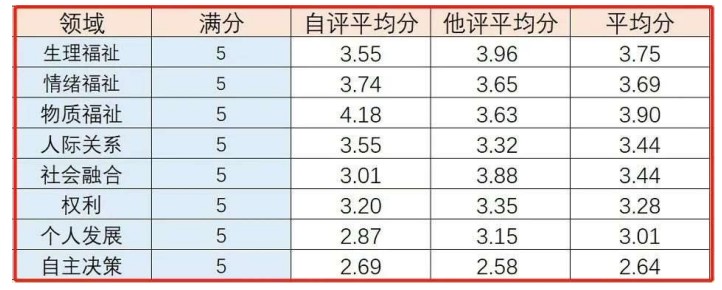
学员入住家合小院一周后,经过基础评估,慧灵得出了一份个案评估报告。报告显示,在自主决策、个人发展和权利这三个领域的得分比较低,且自评与他评分数比较接近,说明无论心青年还是家长都感觉赋能不够,家长替代性决策太多,让心青年失去了很多锻炼的机会。
04 Every child with autism is unique; experience alone cannot guarantee success.
During the interview day, I happened to catch everyone going for a picnic. The young adults with special needs were gathered around a table discussing the details of the picnic. First, they each chose a favorite teacher as their travel partner, and then they received their respective tasks. Little A, who had developmental delays but had good abilities and was enthusiastic, took on the role of assistant, helping the teachers with various tasks. Little B, who had autism and couldn’t speak, was in charge of distributing food, which was his favorite activity. Little C, also on the spectrum, had some emotional issues on the way to the Hui Ling Jiahe that day, so extra attention was needed to monitor his emotional changes. Little D had physical disabilities and couldn’t stand for long periods, so he had to use a wheelchair for transportation but still wanted to be able to move his body within his capabilities…
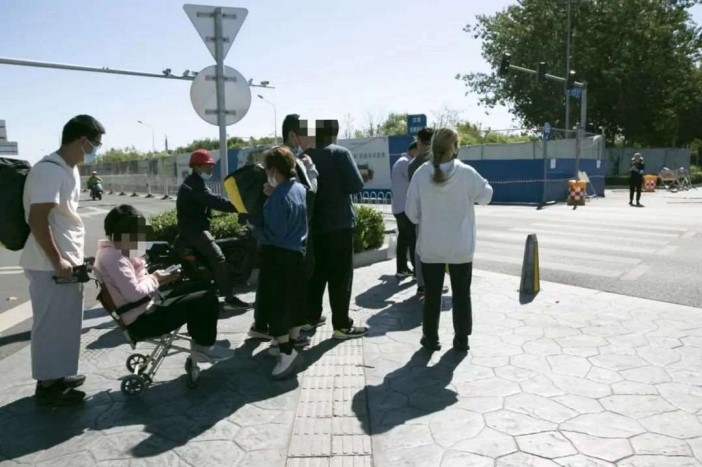
秋游路上,等红绿灯。
“As a special education teacher, it’s not necessary to overly express whether or not one has compassion. It’s not enough to just say you have compassion but secretly reject and despise these children. This kind of attitude won’t sustain you in the long run. Acceptance and recognition are the most important. Some people drool after eating, and some people don’t wipe themselves properly after using the restroom. We shouldn’t let them stay in an unpleasant state just because they don’t know how to clean themselves. Instead, we should find ways to empathetically solve these problems and improve their quality of life. That is the ultimate goal,” said Qian Hongli, a teacher from Xi’an Hui Ling Jiahe.
The autumn outing arranged a variety of group games, divided into teams based on people’s interests and hobbies. They played badminton, Chinese chess, and skipped rope, fully releasing their physical energy and improving their mood. Even the children who were unwilling or unable to participate in the activities received full attention from the teachers. During lunchtime, the sharing of food and the disposal of trash were done appropriately and politely.
It was a very harmonious scene. Unlike many older institutional staff who are generally aunt-level teachers, the teachers at Hui Ling Jiahe are very young, some in their early 20s, even younger than the students. The interaction with peers adds a youthful atmosphere to the integration. Among these young teachers are recent graduates, as well as professionals who have returned from studying in Japan. Their experience is still being accumulated, but what is valuable is that they are willing to accept this group of children.
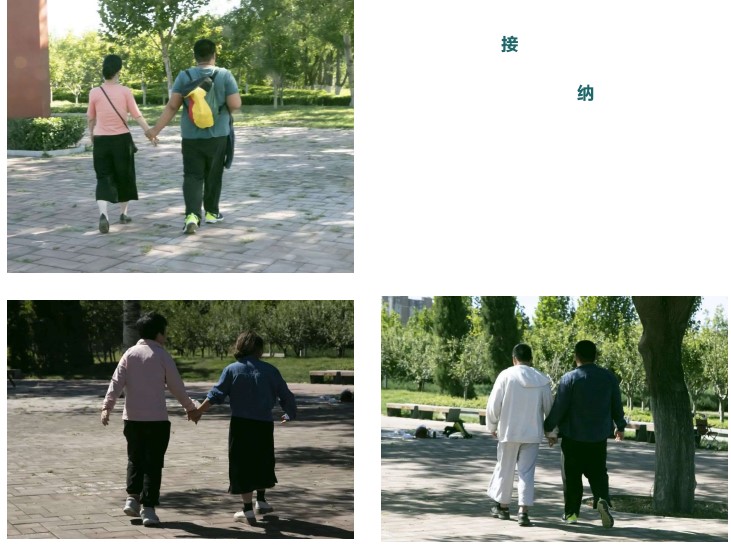
慧灵老师和心青年牵手前行
“As a special education teacher, it’s not necessary to overly express whether or not one has compassion. It’s not enough to just say you have compassion but secretly reject and despise these children. This kind of attitude won’t sustain you in the long run. Acceptance and recognition are the most important. Some people drool after eating, and some people don’t wipe themselves properly after using the restroom. We shouldn’t let them stay in an unpleasant state just because they don’t know how to clean themselves. Instead, we should find ways to empathetically solve these problems and improve their quality of life. That is the ultimate goal,” said Qian Hongli, a teacher from Xi’an Hui Ling Jiahe.
Teacher Qian Hongli has 17 years of work experience and is proficient in providing services both during the day and at night. In her role at the Beijing Hui Ling Jiahe, she is primarily responsible for mentoring and supervising the young teachers while also taking care of the children’s daily lives.
As a new venture, to ensure the smooth operation of the Hui Ling Jiahe project, in July, Hui Ling transferred eight experienced teachers from Guangzhou, Chongqing, Tianjin, and Shaanxi to Beijing. They tackled various issues before and during the initial stages of the project. Qian Hongli and another teacher have spent the longest time with the students, being with them 24 hours a day, understanding their habits and temperaments, and noticing even the slightest changes in each individual.

钱宏丽和孩子们在一起做游戏
When the autistic child, Little Z, first arrived, he seemed very obedient and had good comprehension. When his mother gave him instructions, he immediately followed them. “But this is also a problem. The mother’s instructions are too directive, but the child lacks initiative. Once, when he didn’t eat enough, he couldn’t express himself correctly and ended up slapping himself,” said Qian Hongli.
Qian Hongli used language and actions to stimulate his initiative. When Little Z didn’t know he was thirsty, Qian Hongli said, “Little Z, everyone is drinking water. Are you thirsty?” He replied, “Thirsty.” Qian Hongli simply pointed to where the water jug was and said, “The water is over there. What should you do?” The goal was to let Little Z say the word “pour” himself, and with accompanying actions, connect “thirsty” with “pouring water,” and he succeeded.
Another day, Qian Hongli intentionally showed weakness in front of him, saying, “The trash is so full, and I can’t lift it myself, and no one is helping me. What should I do?” She glanced at Little Z, and after understanding, he actually reached out to help. At the same time, Qian Hongli praised him, saying, “Little Z, you’ve learned to think. I didn’t even ask you to help me, but you came to help. You’re amazing.” A smile immediately appeared on the child’s face. Since then, he has been doing more things on his own initiative. This change has brought great joy to his mother, who feels ashamed for underestimating her child’s potential all this time.
Similar details are reflected in various aspects. For example, there is a child who is afraid of having their nails trimmed. Qian Hongli comforts her by saying that after trimming her nails, they can apply pretty nail polish, gradually helping the child overcome the fear. There are also children who have rigid behaviors, insisting on having all the food from the pot in their own bowl, even if they are already full. In this case, the teacher arranges for them to be the last ones to get their food. And for children who like meat dishes and are unwilling to share with others, a system of separate meals is implemented to ensure a balanced distribution of meat dishes.
“Each autistic child is unique, and developing service skills is a gradual process of observation and personal experience. It’s something that can’t be seen or touched. We have to observe and immerse ourselves with the students, and then diagnose and treat accordingly,” Qian Hongli said. Building relationships with the children is the most challenging part, as it requires emotional investment and linguistic skills that the students are willing to accept. Even if the intentions are good, if the methods are not suitable, the students may not necessarily accept them.
Closing words:
At the initial stage, Hui Ling Jiahe, as a growing organization, is still in the process of building relationships and trust with the students. Everything is progressing smoothly, and more and more families are signing up to participate in the Jiahe experience. Some parents even rent houses near the courtyard to be closer to their children. The Jiahe courtyard is also opening its doors, welcoming everyone to come and experience, to make friends and enhance their abilities.
Compared to internal development, as members of the community, the interaction between the children and their neighbors, the integration with the property management, residents, and businesses in the area, allowing the people around them to understand and accept them, and living in harmony, is a longer-term and challenging task. It requires time, more opportunities to go out into the community, and the wisdom of integration.
Meng Yu’s son, Hehe, is gradually adapting to the atmosphere of the courtyard. From initially turning around and leaving during the renovation, to staying for half an hour on the second visit, to now, after the renovation is completed, he walks around twice, then sits on the sofa next to another child’s grandmother and watches TV. Now, he can stay at Jiahe for a whole day without being impatient or causing trouble. This is a huge progress for Hehe, who is very selective about his environment. In the future, Meng Yu hopes that Hui Ling Jiahe can receive more support from social resources, such as companies willing to provide opportunities for young people to visit, experience, and work.
Meng Weina, on the other hand, has a longer-term vision. She hopes for a nationally influential parent organization that persistently promotes policies and speaks up for the intellectual disability community.
“When Hui Ling was born in the 1980s, it came with the mission to promote policies. Many Hui Ling people, even if they leave here and join other organizations, still carry this gene. Of course, there are also those who give up because they fear difficulties. This is indeed a tiring job. I have persevered for so long and don’t feel like I have made much of an impact. But seeing the changes in the country now, the introduction of many policies that somewhat reflect the appeals made by Hui Ling, I am also very gratified,” Meng Weina said.
In the field of disabilities, she believes that the most urgent and inclusive policy is to establish a government-managed case management center, where detailed records are kept from a child’s birth, diagnosis (the occurrence of disabilities), to later stages of rehabilitation, education, employment, and participation in social activities. Professionals can provide the most suitable services based on the child’s situation, and financial allocations can be more flexible, not concentrated in just a few institutions, but available to all institutions that provide professional services. Of course, such a system requires government leadership, professional assessment and management, and oversight by a credible organization. Whether it can be established or not requires the joint efforts of parents and organizations within the industry.

小院所在的社区内,慧灵的老师(左)教一位心青年读一则派出所张贴的防诈宣传。(本文部分照片和内容来自于公众号"慧灵家合”,家长也可自行关注一下该公众号,了解小院的最新进展)